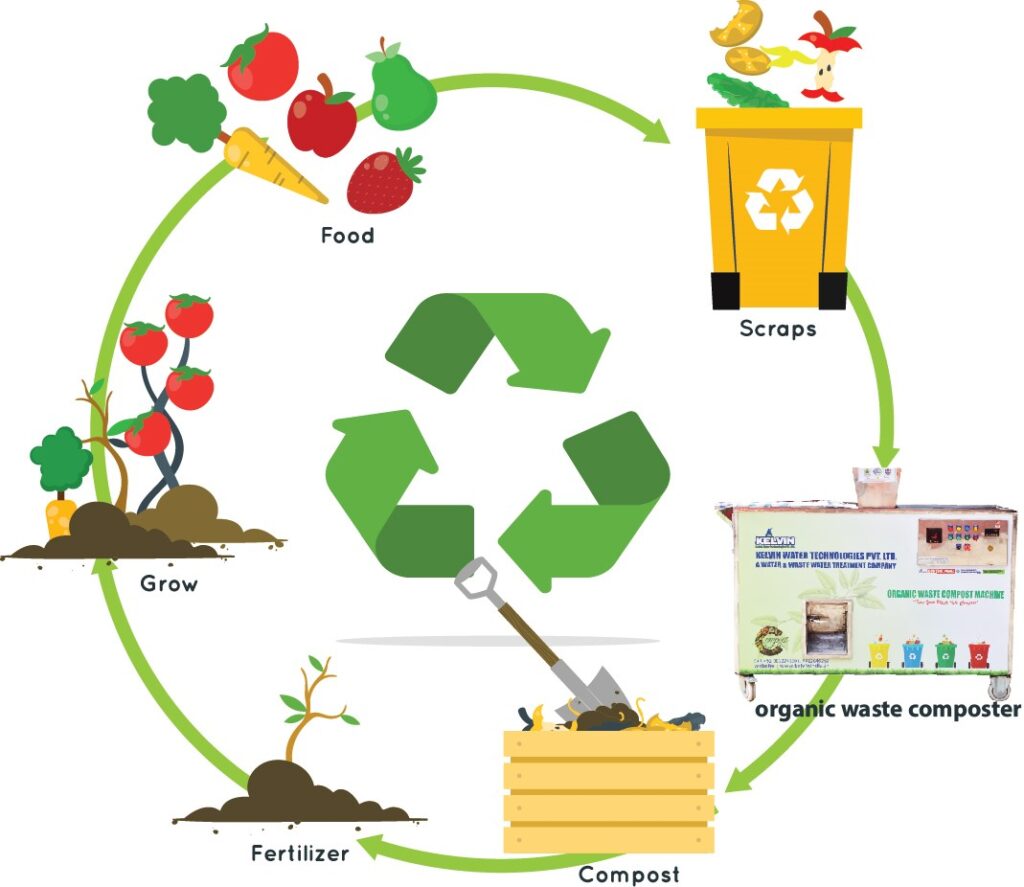Organic Waste & Its Type! How to treat organic waste?
Organic waste is defined as any waste that is derived from living or recently living organisms, including animals, plants, and their byproducts. It can include food scraps, yard waste, paper, wood, textiles, and biodegradable materials such as manure, sewage, and human and animal waste. Composting is a natural process of breaking down organic material into nutrients that can be used to help fertilize the soil.

Types of organic waste:
- Food waste
- Yard waste
- Paper waste
- Wood waste
- Textiles waste
- Manure
- Compost
1. Food Waste is one of the most common types of organic waste. This includes food that is left over at restaurants, grocery stores, or homes. This can include anything from fruits and vegetables to dairy products, meats, and prepared meals. Food waste is a major contributor to waste, and it is estimated that up to 40% of all food produced in India is wasted. In India, food waste is particularly concerning due to its potential environmental impact.
2. Yard waste: This type of waste includes grass clippings, leaves, branches, and other plant material. People are estimated to dispose of approximately 13% of all municipal solid waste in their yards, on the roads, or in public places. This type of waste is most often composted or recycled into plant-based products, such as soil.
3. Paper waste: This type of waste includes newspaper, cardboard, paperboard, and other paper products. Paper waste is often recycled and can be used to make new products. It is estimated that around 60% of all paper waste is recycled.
4. Wood is a type of waste that is derived from trees. This can include tree stumps, sawdust, and other wood products. Wood waste is often recycled and used for fuel, mulch, or compost.
5. Textiles are a form of organic waste. This can include clothing, furniture, bedding, and other materials made from natural fibers such as cotton, wool, hemp, and bamboo. Textiles are often recycled and reused to make new products.
6. Manure is a type of waste that is derived from animals. This can include cow, horse, and poultry manure. Manure is often used as fertilizer and can be used to improve the health of soils.
Human and animal waste is a type of organic waste that includes sewage, urine, and other waste products. It is often treated and recycled into new products such as fertilizer or compost. This waste is high in nutrients and can be used to improve soil fertility.
7. Compost is a type of waste that is made up of decaying plant and animal material. It is often used as fertilizer and can be used to improve the health of soils. Compost is also used to create energy, such as biogas, and can be turned into plant-based products such as mulch or soil.
Organic waste is a major contributor to global warming, air and water pollution, and other environmental problems. It is important to reduce the amount of organic waste that is produced and to reuse and recycle as much as possible. By reducing, reusing, and recycling organic waste, we can help reduce the environmental impacts of organic waste and create a more sustainable future.
Advantages of a Composter Machine:
Kelvin Water Technologies Pvt. Ltd. engineers have created a revolutionary product that has been designed to provide an efficient and ecologically friendly way to convert organic waste into compost, which is known as the Organic Waster Converter Machine. It will take only 24 to 28 hours to convert the organic waste into compost. This machine has the potential to revolutionize the way people manage their organic waste and can help reduce the amount of waste going to landfills. This machine is in fully automatic mode, which converts waste into compost very quickly and effectively with a single button click. Further, the composter machine has numerous benefits for the environment, including :
- This machine is also an excellent way to reduce greenhouse gas emissions into the atmosphere. and also help reduce the amount of carbon dioxide released into the atmosphere.
- This type of machine converts solid waste into nutrient-rich compost, and the finished compost can be used to fertilize gardens, lawns, and other landscaping projects.
- This is a great way to save time and effort when composting while also reducing manpower requirements.
- This machine also helps to reduce the amount of methane that is released into the atmosphere, which can help prevent further warming of the planet.
- This composter machine can help reduce the amount of water used in composting. This can help to conserve water and reduce the amount of energy used in the composting process.